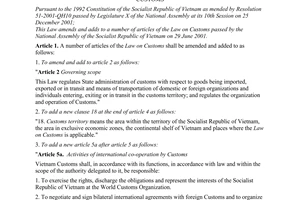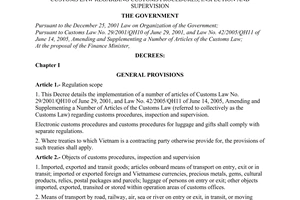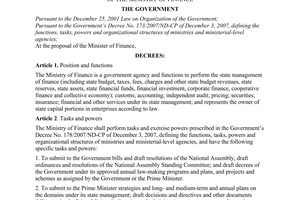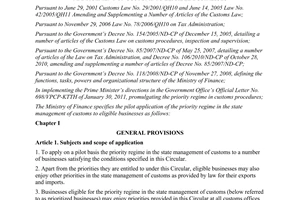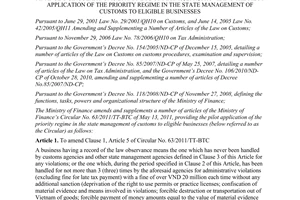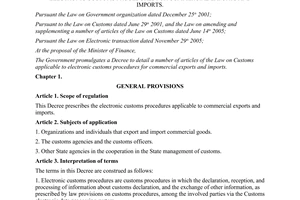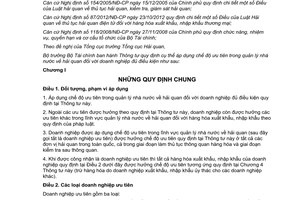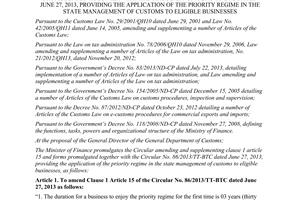Circular No. 86/2013/TT-BTC the priority regime of customs to eligible businesses đã được thay thế bởi Circular No. 72/2015/TT-BTC priority policy in customs procedures và được áp dụng kể từ ngày 26/06/2015.
Nội dung toàn văn Circular No. 86/2013/TT-BTC the priority regime of customs to eligible businesses
|
THE MINISTRY
OF FINANCE |
SOCIALIST
REPUBLIC OF VIET NAM |
|
No. 86/2013/TT-BTC |
Hanoi, June 27, 2013 |
CIRCULAR
PROVIDING THE APPLICATION OF THE PRIORITY REGIME IN THE STATE MANAGEMENT OF CUSTOMS TO ELIGIBLE BUSINESSES
Pursuant to the Customs Law No. 29/2001/QH10 dated June 29, 2001 and Law No. 42/2005/QH11 dated June 14, 2005, amending and supplementing a number of Articles of the Customs Law;
Pursuant to the Law on tax administration No. 78/2006/QH10 dated November 29, 2006, Law amending and supplementing a number of Articles of the Law on tax administration, No. 21/2012/QH13, dated November 20, 2012 and documents detailing the Law on tax administration;
Pursuant to the Decree No. 154/2005/ND-CP dated December 15, 2005 of Government detailing a number of Articles of the Customs Law on customs procedures, inspection and supervision;
Pursuant to the Decree No. 87/2012/ND-CP dated October 23, 2012 detailing a number of Articles of the Customs Law on e-customs procedures for commercial exports and imports;
Pursuant to the Government’s Decree No. 118/2008/ND-CP dated November 27, 2008, defining the functions, tasks, powers and organizational structure of the Ministry of Finance;
At the proposal of General Director of Customs,
The Minister of Finance promulgates the Circular specifying application of the priority regime in state management of customs for eligible businesses as follows:
Chapter I
GENERAL PROVISIONS
Article 1. Subjects and scope of application
1. To apply the priority regime in the state management of customs to businesses satisfying the conditions specified in this Circular.
2. Apart from the priorities they are enjoyed under this Circular, businesses may also enjoy other priorities in the state management of customs as provided by law for their exports and imports.
3. Businesses eligible for application of the priority regime in the state management of customs (hereinafter abbreviated to prioritized businesses) may enjoy priorities provided in this Circular at all customs offices nationwide, even at the stage of carrying out procedures for customs clearance for goods and the stage of post-customs clearance examination.
4. Once a business is recognized as a prioritized one, all of its exports and imports specified in Article 2 below will enjoy the respective priority regime specified in Chapter 4 of this Circular (except goods which are imported, exported under consignment for other businesses).
Article 2. Types of prioritized businesses
Prioritized businesses include three types:
1. Businesses eligible for priorities in export and import of all goods items and in all forms of export and import.
2. Businesses eligible for priorities in export of farm produces, fisheries products, textile and garment, leather and footwear and import of materials and accessories for production of exports mentioned above.
3. Businesses which are granted certificate of hi-tech businesses by the Ministry of science and technology as prescribed in Law on high technology, eligible for priorities in import of goods in serve of production; and export of hi-tech products.
Chapter II
CONDITIONS ON PRIORITIZED BUSINESSES
Businesses which are considered for the priority regime as prescribed in this Circular must fully satisfy the conditions from Article 3 through Article 9 at below:
Article 3. Condition of law observance
1. The period for assessment of a business’s law observance is 24 (twenty four) months up to the date on which the General Department of Customs receives the business’s written request for being recognized as a prioritized business.
2. During the period specified in Clause 1 of this Article, if business does not violate law on tax, customs seriously to be sanctioned over one of acts below, it will be considered as satisfying the conditions of law observance:
2.1. To export, import goods in list of goods prohibited for export, prohibited for import in contravention with regulations of law.
2.2. To be sanctioned over acts of tax evasion, tax fraud, smuggle, illegal transport of goods across border;
2.3. To be handled for not more than 3 (three) times by the customs offices, taxation agencies for act of wrong declaration as result of lacking payable tax amounts, increasing the exempted, reduced, refunded tax amounts with administrative violation sanction level by fine falling beyond competence of Directors of Department or similar titles as prescribed by law on handling of administrative violations.
2.4. To be handled administratively by customs offices for act of not complying with request of customs offices in the customs inspection, provision of business’s information and dossier.
Article 4. Condition of payment
To implement payment for export and import consignments in accordance with provisions of State Bank. To implement tax payment through banks or treasuries
Article 5. Condition of accounting and finance
Having applied accounting standards accepted by the Ministry of Finance. All economic activities must be reflected fully in accounting books. Annual finance statements are audited by an eligible audit company in which essential contents are accepted and business operation is assessed to be effective, no overdue tax debts in 2 (two) years adjacent to the considered year.
Article 6. Condition of export and import turnover
1. For businesses specified in Clause 1, Article 2 of this Circular: the export or import turnover must be at least USD 200 (two hundred) million/year.
2. For businesses specified in Clause 2, Article 2 of this Circular: the export or import turnover must be at least USD 50 (fifty) million/year.
3. For businesses specified in Clause 3, Article 2 of this Circular: not provided for the export or import turnover.
4. The export or import turnover specified in Clause 1 and Clause 2 of this Article are the average turnover within 2 (two) considered years.
Article 7. Conditions of carrying out e-customs procedures, e-tax procedures
1. At time when customs offices consider, assess, appraise, businesses have carried out e-customs procedures with customs offices, e-tax procedures with taxation agencies.
2. Businesses have technical infrastructure applying information technology meeting requirement on e-data exchange between businesses and customs offices.
Article 8. Condition of reliability
1. Customs offices can determine reliability in businesses’ law observance in the future based on criteria about businesses' internal control apparatus, finance control mechanism, cooperation of businesses with customs offices, tax administration agencies (according to the set of assessment criteria of the General Department of Customs).
2. For businesses meeting conditions specified in from Article 3 thru Article 7 of this Circular, but customs offices have not yet had full grounds to determine reliability in businesses’ law observance in the future, they have not yet been recognized as prioritized businesses.
Article 9. Voluntary requests for being recognized as prioritized businesses
1. Businesses wishing to be applied the priority regime, may self-make reference with conditions, request in writing the General Department of Customs to consider and recognize them as prioritized businesses and commit to well complying with law.
2. Businesses shall build programs, plans, arrange their apparatus, personnel, invest means and equipment to ensure full satisfaction and maintain conditions provided for being prioritized businesses.
Chapter III
PROCEDURES FOR APPRAISAL, RECOGNITION, EXTENSION, TEMPORARY SUSPENSION AND SUSPENSION OF PRIORITIZED BUSINESSES
Article 10. Competence for recognition, extension, temporary suspension and suspension of application of priority regime
1. General Director of Customs has competence to make decisions on recognition, extension, temporary suspension and suspension of application of priority regime.
2. The Post-Clearance Examination Department shall assume the prime responsibility for and assist the General Director of Customs in appraising conditions, recognition, extension, temporary suspension, suspension and management of prioritized businesses.
3. Units under the General Department of Customs, Customs Departments of provinces and cities shall coordinate, provide information, make comments, assess about businesses’ law observance as well as activities of export and import.
Article 11. Dossiers of request for recognition of prioritized businesses
1. The General Department of Customs (Post-Clearance Examination Department) is unit receiving dossiers of request for recognition of prioritized businesses.
2. A dossier includes:
2.1. Written request: 01 original (made according to the form 01/DNUT promulgated together with this Circular) in which businesses self determine and request for type of prioritized business;
2.2. Report on export and import statistics of the business in the last 02 years: 01 original;
A statistical period lasts whole year, from January 1 to December 31 of a year. For the current year of operation: if 6 months or less have elapsed, figures of the last 2 years are required; if more than 6 months have elapsed, figures of these months are required together with projected figures for the whole year (made according to form 02/DNUT promulgated together with this Circular).
2.3. A report on the business’s law observance in the last 02 years (in case the business has been handled for violations, number of handling times, acts of violation, sanctioning forms and levels, sanctioning authorities and execution of sanctioning decisions): To submit 01 original;
2.4. Audited annual financial statements for the last 02 years: To submit 01 copy of each statement certified by the business;
2.5. Written conclusions on the latest audit or inspection (conducted within 1 year, if any): To submit one copy certified by the business and produce the original thereof;
2.6. Documents self-analyzing, assessing business operation and finance conditions of business;
2.7. Documents self-analyzing the system of internal control of business; process of internal professional operation, in which describe fully the process of professional operations of all related divisions in the provision string (such as divisions related to procedures for export and import: logistic, accounting, goods purchase, goods sale, product quality control);
2.8. Other papers which enterprises assume that they are necessary to provide for customs offices, and assist customs offices in appraisal (such as certificates of rewarding, international and national certificates, and management standards applied).
Article 12. Appraisal of conditions on prioritized businesses
1. Subjects of appraisal: Being businesses and branches, subsidiary companies performing dependent accounting.
2. Appraisal form includes dossier appraisal and practical appraisal.
2.1. Dossier appraisal is performed:
- On the basis of dossier provided by business, looking through database; and other information sources of the customs law observance and export and import turnover of business.
- Evaluations and comments of the concerned agencies specified including:
+ Agencies assessing the customs law observance (including the tax law observance for exports and imports) are Customs Departments of provinces, cities where businesses located head offices, where businesses have export, import operations and units affiliated the General Department of Customs.
+ Agencies appraising HS code of exports, imports are Customs Departments of provinces and cities where businesses located head offices. Goods codes which businesses have exported, imported (except for goods items imported under types of not taxable subject such as import in export processing zones, export from export processing zones) agreed upon by businesses and the provincial Customs Departments of appraisal will serve as a basis to put in memorandum for the business to make customs declaration upon carrying out export or import procedures within nationwide scope.
+ Agencies confirming the domestic tax law observance and performance of e-tax procedures are taxation agencies where businesses registered and performed the duties of domestic tax payment.
+ Agencies shall assess the law observance in accordance with their function and competence. Within 10 (ten) working days, after receiving written request of the General Department of Customs, agencies shall answer in writing.
In case where dossier fails to meet fully conditions specified in Chapter 2 of this Circular, the General Department of Customs must have written reply for businesses.
2.2. Practical appraisal: Post-Clearance Examination Department shall directly perform or coordinate with Customs Departments of provinces and cities where businesses located head offices in performing the practical appraisal.
The practical appraisal is performed after dossier appraisal result of business met conditions as provided or may be performed at the same time with process of dossier appraisal, content includes:
- To assess the observance of customs law, tax law for the export and import operations of business;
- To assess the internal control ability of business;
- To examine the technical infrastructure applying information technology of business so as to meet requirement on e-data connection and exchange between businesses and customs offices, tax agencies.
3. Handling of appraisal results:
Based on appraisal results; evaluations and comments of units, agencies of inside and outside sector; conclusions of audit and inspection (if any); other collected information; compared with conditions on prioritized businesses specified in Articles 3 thru Article 9, Chapter II of this Circular, the Post-Clearance Examination Department make assessment report and submit it to the General Director of Customs for consideration and decision.
4. The time limit for consideration to recognize the prioritized business shall not exceed 45 (forty five) working days after receiving a full dossier. For complex cases, cases of big businesses, the time limit may be extended once but not exceed 30 (thirty) working days. If businesses are assessed as not meeting conditions of prioritized business, the General Department of Customs shall have written notice to businesses thereof.
Article 13. Making the memorandum
1. In case where a business is assessed as meeting conditions of prioritized business, approved by the General Director of Customs, the Post-Clearance Examination Department and the business will make the memorandum (according to form 03/DNUT) and submit to by the General Director of Customs for signing a memorandum of understanding (MOU).
2. In addition to contents required depending on the characteristics and practical operation of each business, the MOU must contain the following principal details:
- Name, address, telephone and facsimile numbers and email address of the business;
- Type of prioritized business;
- Responsibilities of business;
- Responsibilities of the General Department of Customs;
- Agreement on identification of headings of goods items exported or imported by the business (except for goods items imported under types of not taxable subject such as import in export processing zones, export from export processing zones).
Article 14. Decisions on recognition of prioritized businesses
1. The General Director of Customs shall sign decides on recognition of prioritized businesses.
2. The time limit for issuing a decision on recognition of a prioritized business shall not exceed 15 (fifteen) working days, after the appraisal is completed.
3. The form of decision on recognition of prioritized business is promulgated together with this Circular (form No. 04/DNUT).
Article 15. Revaluation and extension
1. The duration for a business to enjoy the priority regime for the first time is 24 (twenty four) months after the General Director of Customs signs a decision on application of the priority regime to this business. Upon the expiration of this duration, the General Department of Customs shall conduct revaluation and, if the business still satisfies the specified conditions, may extend the duration of application of the priority regime.
2. 60 (sixty) days before the expired date of decision on recognition of the prioritized business, the General Department of Customs shall notify for business to have application requesting for extension of the priority regime.
3. Procedures for revaluation:
- Dossier appraisal as prescribed in point 2.1, Article 12 of this Circular:
- Practical appraisal performed in principle of risk control.
Duration for consideration, revaluation shall not exceed 30 (thirty) working days. If procedures for revaluation and re-recognition have not yet completed despite the decision on recognition of prioritized business is expired, the business is still applied full priority regime.
4. If results of the revaluation show that the business still satisfies the specified conditions, the General Department of Customs shall, based on the law observance level of business, issue a decision to extend the duration of application of the priority regime to the business for subsequent 36 (thirty-six) months to 60 (sixty) months (made according to form No. 05/DNUT promulgated together with this Circular):
- 60 (sixty) months for businesses without any handled violation or with 01 (one) violation in each field as tax, customs and sanctioned administratively with a fine not exceeding competence of Directors of Sub-department;
- 36 (thirty six) months for prioritized businesses with more than 01 (one) violation in each field as tax, customs and sanctioned administratively with fine of every time not exceeding competence of Directors of Sub-department, but still satisfy conditions of law observance as prescribed in Article 3 of this Circular;
Article 16. Temporary suspension of application of the priority regime
1. General Director of Customs shall consider and issue decision on temporary suspension of application of the priority regime as prescribed in chapter IV of this Circular when defining that businesses have one of following violations:
The businesses violate one of provisions in Article 3 of this Circular.
1.2. The businesses fail to meet provisions in Article 8 of this Circular.
2. Duration for temporary suspension shall be between 60 (sixty) and 180 (one hundred eighty) days. In cases with legitimate reasons (due to objective reason), businesses still fail to remedy all mistakes after the duration above has been expired, they may be extended time limit of temporary suspension for once but not exceed 60 (sixty) days.
On the basis of reports assessing violation made by the concerned provincial Customs Departments, the clarifying reports made by businesses (clearly stating measures of innovation, method of implementing recommendations of customs offices), if businesses still satisfy full conditions of prioritized businesses or after the concerned functional agencies assess that the violations of businesses still satisfy conditions of law observance as prescribed in Article 3 of this Circular, the General Director of Customs shall consider and decide on cancellation of decision on temporary suspension.
3. If units under and affiliated the General Department of Customs detect that businesses have violations, they must report to the General Department of Customs (Post-Clearance Examination Department) for consideration, making decisions on temporary suspension of application of the priority regime (form 06/DNUT), decisions on cancelling decision on temporary suspension (form 07/DNUT promulgated together with this Circular).
Article 17. Suspension of application of the priority regime
1. The General Director of Customs shall consider and issue decisions on suspension of application of the priority regime as prescribed in chapter IV of this Circular (form 08/DNUT) in the following cases:
1.1. The businesses fail to meet conditions on prioritized business as prescribed in this Circular.
1.2. Businesses fail to remedy mistakes, violations as notified by customs offices; and businesses fail to remedy mistakes, errors after the time limit of temporary suspension of application of the priority regime has expired.
1.3. Businesses apply for withdrawal from the priority regime; or time limit of recognition is expired but businesses fail to request for recognition of prioritized business.
2. If a business has been suspended for the priority regime, the General Department of Customs shall refuse receipt of dossier requesting for recognition of prioritized business of this business in 02 (two) next years.
Chapter IV
THE PRIORITY REGIME
Article 18. Priorities at the stage of customs clearance
1. Exemption from examination of customs dossiers, exemption from practical examination of goods (except cases showing clear signs of violation):
- Businesses shall take responsibility before law and customs offices for the legality, validity and contents of their customs declaration.
- Exemption from practical inspection of goods includes exemption from manual inspection and inspection by machines and equipment. In case of having to examine, businesses are prioritized to be advance examined, examined by technical means, request for goods inspection at places selected by businesses.
2. To be used set of documents including commercial invoices, goods package papers, goods delivery orders and tax self-declaration with seal and signature of representatives of businesses for the goods customs clearance in case the database system of customs offices meet malfunction or temporarily stop operation.
In this case, the Customs Sub-departments where register declaration, have e-system get malfunction, temporarily stop operation are responsible for notifying the border-gate customs Sub-departments where make customs clearance for coordination in implementation.
3. Not having to register the consumption norm of raw materials with customs offices, not having to submit the liquidity reports for customs offices but provided that businesses have software of management of exports and imports meeting requirements on management and inspection of customs offices.
Quarterly, businesses must submit reports for customs offices about export – import – inventory of imported raw materials on basis of norm formulated by businesses. Businesses shall take responsibility before law for the accuracy of norms formulated by them.
Article 19. Priorities at the post-customs clearance stage
1. During the time of application of the priority regime to businesses, customs offices shall not conduct post-customs clearance inspection at the offices of these businesses (except cases showing clear signs of violation).
When being notified by customs offices of their errors or matters which must be clarified, businesses shall review these errors or matters and give explanations to customs offices. Form and places of making explanations are complied with Article 145 of the Ministry of Finance’s Circular No. 194/2010/TT-BTC of December 6, 2010.
2. Inspection for recognition, extension or suspension of the priority regime. Scope and content of inspection shall depend on requirements of management and monitoring of customs agencies.
Article 20. Single customs declaration
1. Single customs declaration and time limit for liquidity of single customs declarations comply with Article 9 of the Government’s Decree No. 154/2005/ND-CP of December 15, 2005.
2. Prioritized businesses may make single customs declarations in either of the following forms:
- For goods exported or imported across the border or through border gates, customs declaration shall be made first, exportation or importation later;
- For goods imported on the spot; and materials, components and spare parts purchased from bonded warehouses for production, importation shall be conducted first (supervised and recorded in minutes of goods delivery and receipt by businesses and owners of bonded warehouses), customs declaration shall be conducted later.
Article 21. Priorities of tax procedures
1. To be prioritized to apply the regime of self-liquidity, tax refund first and inspection later.
Businesses may self-calculate quantity of goods practically put into production, goods in inventory, self-calculate the additional payable tax amounts or tax amounts not payable. Businesses shall take responsibility before law and customs offices for the liquidity content. Based on the self-liquidity result of businesses, customs offices may issue decisions on liquidity, tax refund, no collection of tax.
2. Not be required to pay amounts of delay payment, not be handled administrative violations of customs, tax for cases of being imposed tax because the goods codes already unified and appraised by customs agencies previously are incorrect and businesses still be considered as satisfying the condition of law observance.
Chapter V
MANAGEMENT OF PRIORITIZED BUSINESS
Article 22. Responsibilities of Customs offices
1. Post-Clearance Examination Department is specialized unit assisting the General Director of Customs in implementing the following tasks:
To advise for formulation and completion of the priority regime;
1.2. To preside over appraisal and organize collection of comments of relevant units, agencies;
1.3. To implement the annual survey regime to assess maintenance of conditions of prioritized businesses;
1.4. To be focal agency in advising to handle matters arising; advising in international cooperation regarding prioritized businesses;
1.5. To assign customs officers in specialized charge of management of prioritized businesses and to notify the prioritized businesses of list of these customs officers
Regularly monitor, collect, analyze operation, data of exports and imports of businesses so as to assist businesses in increasing the capability of law observance, early detecting mistakes to timely remedy. In case of detecting that businesses have mistakes or matters need be clarified, to notify businesses for these businesses to self-review.
- If businesses recognize that detection of customs office is right, to request businesses for self-remedy (such as declare additionally; supplement documents; pay tax additionally);
- If businesses disagree with notice of customs office, businesses must have written explanations (enclosed with vouchers, documents as proving).
1.6. To be ready to satisfy, explain at requests of businesses about policies, customs law and tax law;
1.7. To train knowledge of prioritized businesses for the provincial Customs Departments and to be focal agency of businesses recognized as prioritized business.
2. At the provincial Customs Departments, depend on quantity of prioritized businesses in geographical areas, to assign a group of officers to implement the following tasks:
2.1. To guide businesses in making dossiers of request for recognition of prioritized businesses;
2.2. To organize practical inspection of conditions of businesses at the request of the General Department of Customs (Post-Clearance Examination Department);
2.3. To make report of businesses assessment;
2.4. To regularly monitor the export and import operation of businesses, assist businesses to maintain conditions and timely detect, remedy mistakes. Periodically report result of monitoring businesses to the General Department of Customs;
2.5. To coordinate with businesses in handling matters arising in geographical areas managed by the provincial Customs Departments.
Article 23. Responsibilities of prioritized businesses
1. To properly observe the law.
2. To establishment a division or appoint a person in specialized charge of implementing the priority regime. This division has responsibilities: To be focal division to exchange, provide information and coordinate with divisions in specialized charge of prioritized businesses of customs agencies; to perform the report regime; to control all operations of businesses under the priority regime.
3. To formulate and implement the regime of regular self-examination and report result of export and import operation to the General Department of Customs. Periodically, to supply status, figures about exports, imports to customs offices:
- Quarterly, businesses supply status, figures of exports and imports in the previous quarter to the General Department of Customs (according to the form 09a/DNUT, 09b/DNUT promulgated together with this Circular);
- Method of provision: Through internet connected between the General Department of Customs and businesses.
4. To formulate, notify in writing customs offices of information of division/person in charge of focal communication role of businesses.
5. To be responsible for implementing the regime of exchanging information regularly with customs offices. To be ready to coordinate, clarify doubts at the request of customs offices or customs officers in charge of management over businesses.
6. Regularly implement self-examination, detect and remedy mistakes. When having a new export or import goods item of which the two parties have not reached agreement on its identification number, businesses shall propose a goods identification number and notify it to the provincial Departments of Customs where businesses located head offices for consideration and approval.
7. To actively coordinate with customs offices in case of customs inspection. When being notified by the Customs offices of errors or unclear matters in their customs dossiers, businesses shall re-check, reply and explain notified errors or matters in an adequate and prompt manner.
8. In case customs offices conduct examination at the offices of businesses or businesses request customs offices to come and work on unclear matters, businesses shall create favorable conditions for and comprehensively coordinate with examination teams. For matters on which remain divergent opinions, they shall coordinate with customs offices in finding lawful solutions.
9. Before enjoying the priority regime provided in this Circular, businesses notify the General Department of Customs and district-level Customs Sub-Departments with which procedures for their exported or imported goods are carried out of agents carrying out customs procedures for their exported or imported goods and commit the law observance by these agents. In case of change of an agent, businesses shall notify such to customs offices mentioned above. Prioritized businesses shall regularly examine the law observance by their agents so as to detect errors (if any) and promptly notify detected errors to customs offices.
Chapter VI
HANDLING OF VIOLATIONS, COMPLAINTS, DENUNCIATIONS AND ORGINAZING IMPLEMENTATION
Article 24. Handling of violations
1. Prioritized businesses committing law violations shall, depending on the nature and severity of their violations, be handled under law.
2. Organizations and individuals are strictly prohibited from taking advantage of this priority regime to violate policies and laws. Violators shall, depending on the nature and severity of their violations, be administratively handled or examined for penal liability under law.
Article 25. Complaints and denunciations
1. All individuals and organizations may complain about, and all citizens may denounce law violations in the course of implementation of this Circular.
2. The lodging and settlement of complaints and denunciations comply with the law on complaints and denunciations.
Article 26. Implementation responsibility
1. Pursuant to this Circular, the General Director of Customs shall direct and guide customs offices in implementing this Circular.
2. The General Department of Customs shall closely coordinate with related agencies and units in assuring proper and effective implementation of this Circular.
Article 27. Effect
1. This Circular replaces Circular No. 63/2011/TT-BTC dated May 13, 2011 and the Circular No. 105/2011/TT-BTC dated July 12, 2011 of the Ministry of Finance, and takes effect 45 (forty five) days from the date of its signing.
2. The prioritized businesses which are applied the Circular No. 63/2011/TT-BTC dated May 13, 2011 and the Circular No. 105/2011/TT-BTC dated July 12, 2011 of the Ministry of Finance may continue application of the priority regime as prescribed in this Circular. The re-assessment, re-extension for these businesses shall comply with provision in Article 15 of this Circular. If a prioritized business wishes to transfer type of prioritized businesses as prescribed in Article 2 of this Circular, the General Director of Customs shall consider, decide, procedures for appraisal shall comply with provisions in this Circular.
|
|
FOR THE
MINISTER OF FINANCE |
------------------------------------------------------------------------------------------------------
This translation is made by LawSoft and
for reference purposes only. Its copyright is owned by LawSoft
and protected under Clause 2, Article 14 of the Law on Intellectual Property.Your comments are always welcomed

